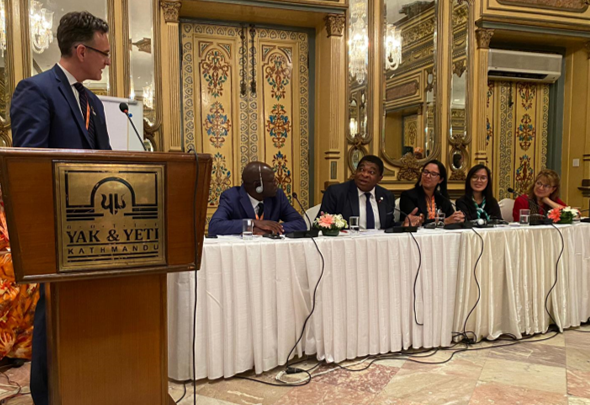WATCH: Women inspiring action, prioritizing good nutrition
March 6, 2024
Gender equality at the 2019 SUN Global Gathering and beyond: Kathmandu Call to Action on Women and Girls’ Nutrition
Nutrition International and the Scaling Up Nutrition Movement (SUN) Secretariat co-hosted the 2019 SUN Global Gathering’s gender workshop, entitled “Productive, not just reproductive! The power of gender equality and empowering women and girls to scale up nutrition.”
Posted on February 27, 2020

From left to right: Joel Spicer, President and CEO, Nutrition International; Djibril Bagayoko, Head of the Nutrition Coordination Cell and Scaling Up Nutrition Focal Point of the Government, Ministry of Public Health and Hygiene, Mali; Martin Chungong, Secretary-General, Inter-Parliamentary Union and SUN Movement Lead Group member, Cameroon; Katia Santos Dias, Country Director, Mozambique, GAIN; Jade Delgado, SUN Movement Civil Society and Girls’ Scout Youth Leader, Philippines; and Lauren Landis, Director of Nutrition, World Food Programme.Kathmandu, NEPAL — Nutrition International and the Scaling Up Nutrition Movement (SUN) Secretariat co-hosted the 2019 SUN Global Gathering’s gender workshop, entitled “Productive, not just reproductive! The power of gender equality and empowering women and girls to scale up nutrition.”
A response to SUN’s Call to Action on Gender Equality and the Empowerment of Women and Girls launched in May 2019 by the SUN Lead Group, the workshop was an opportunity to share experiences and learn from successful country approaches in ensuring gender-responsive nutrition actions, to provide guidance on how to put the Call to Action in practice, to spur new partnerships in-country, and to expose participants to global approaches, methods and tools to address the link between gender and nutrition. It also aimed to explore how to ensure nutrition and gender actions are tackled in tandem in SUN’s next phase and in the Strategy and Roadmap 2021-2025.
The workshop, which was extremely well attended, was opened by Uma Koirala, Civil Society Alliance for Nutrition, Nepal (CSANN), and moderated by Joel Spicer, President and CEO, Nutrition International. It featured a stimulating panel discussion by Djibril Bagayoko, Head of the Nutrition Coordination Cell and SUN Focal Point, Ministry of Public Health and Hygiene, Mali; Lauren Landis, Director of Nutrition, World Food Programme; Jade Delgado, SUN Movement Civil Society and Girls’ Scout Youth Leader, Philippines; Martin Chungong, Secretary-General, Inter-Parliamentary Union and SUN Movement Lead Group member, Cameroon; and Katia Santos Dias, Country Director, Mozambique, GAIN.
The panel discussion was followed by smaller group discussions focusing on how to move the wonderful ideas circulating into actionable initiatives. The group I facilitated − and indeed all the breakout groups − recommended a plethora of concrete, forward looking and actionable initiatives. In fact, there was such an abundance of strong ideas that it was suggested they be turned into an action-oriented document, and thus was born the Kathmandu Call to Action on Women and Girls’ Nutrition: a compilation of practical actions that we as a community must take over the next 12 months to deliver transformational change in women and girls’ nutrition.
The document emanated from the discussions in the workshop. Although it espouses much of the same spirit to action as the SUN Call to Action − a joint effort from SUN, Nutrition International, Global Affairs Canada and Save the Children which sets out what leaders from SUN countries, multilateral organizations, the private sector, civil society and regional organizations can do to further the cause of gender and nutrition − it is a stand-alone document.
The Kathmandu Call to Action on Women and Girls’ Nutrition outlines the urgent need to focus on women and girls as the key to ending malnutrition. The Call to Action reminds us that the Tokyo Nutrition for Growth Commitment Guide states that a good commitment should consider women in its development, planning and targeting, and the lack of specific emphasis on actions for scaling women and girls’ nutrition risks a missed opportunity.
I hope you read the Call To Action and think about ways you can work to make this Call to Action and the SUN’s Call to Action a reality, and more importantly, I hope you are inspired to act!